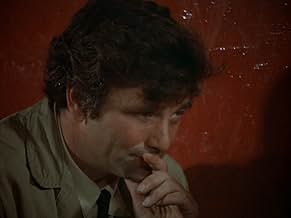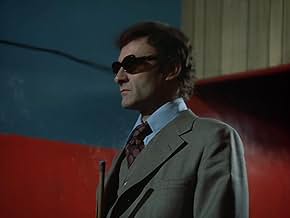A Friend in Deed
- Episode aired May 5, 1974
- TV-PG
- 1h 35m
A police commissioner provides a false alibi for a neighbor who killed his wife in a fit of rage. He then kills his own wife in cold blood and blackmails the neighbor into faking an alibi fo... Read allA police commissioner provides a false alibi for a neighbor who killed his wife in a fit of rage. He then kills his own wife in cold blood and blackmails the neighbor into faking an alibi for himself. Lt. Columbo has to untangle this mess.A police commissioner provides a false alibi for a neighbor who killed his wife in a fit of rage. He then kills his own wife in cold blood and blackmails the neighbor into faking an alibi for himself. Lt. Columbo has to untangle this mess.
- Director
- Writers
- Stars
- Salesgirl
- (as Arlene Martell)
- Director
- Writers
- All cast & crew
- Production, box office & more at IMDbPro
Featured reviews
This particular program, though, is the one I'd probably label my all-time favorite - among many, including those with the ubiquitous Columbo "killers," Jack Cassidy, George Hamilton, etc.
One of the greatest mistakes in the entire history of film was the casting of Peter O'Toole in the lead for "Man of La Mancha," rather than Richard Kiley, whose Broadway performance in this role was among the most acclaimed, ever. Kiley was an immensely- and diversely-talented actor, who should be more prominently recognized and remembered among his peers than he is.
His portrayal as the egotistic, manipulative, greedy deputy police commissioner, and the villain of this episode, is outstanding. The "shtick" of this series, of course, included the usually smooth, urbane, well-dressed, cosmopolitan qualities of the villains - contrasted markedly with Columbo's being the opposite in all of these.
This aspect is certainly apparent here - and the only somewhat puzzling part of the story is the seeming absence of Kiley's knowledge of Columbo's abilities beneath his sloppy exterior - and he would have certainly seen the records of the department certifying the lieutenant's significant abilities.
The main paradox in the history of "Columbo" was the ease with which he seemed to be able always to remain "under the radar," both within the department (even with those with whom he was most closely associated) and on the outside - despite having had to possess a better record for detection and solution of serious crimes than Sherlock Holmes, Hercule Poirot and Sam Spade - combined.
There is no way a review of a "Columbo" episode could be a spoiler. We know from the outset that Kiley is the villain here - however, Columbo's inevitable foiling his devious, wily superior, is perhaps the most clever in the history of this long series.
As with many TV film series (such as Perry Mason), if you like one or two of them then you'll pretty much like them all. This entry in the Columbo series pretty much follows the usual formula we know the killer and the "perfect" plan but then watch Columbo follow his hunch and gradually starts to pick holes in the story he is told before eventually finding enough to prove his suspicions. Saying this is not a spoiler it is simply what happens in all the films. With this strict adherence to formula it is usually down to several factors whether or not the Columbo film stands out or if it is just average. Here the "deed" of the title is a murder and the friend involved in the "deed" is none other that the Deputy Police Commissioner Mark Halperin. This sets up quite a good story early on that only has a few weaknesses specifically the steps that Halperin takes later in the film, they seem unlikely, too impulsive and risky for such a powerful man. It might have worked if he had been written as arrogant or cocky but he isn't, he is smart and scheming. Once you get past these though the film is strong mainly because it gets the cat'n'mouse stuff spot on.
The attempts at comedy fall flat, nor do they manage to add to the character of Columbo the broken car and the desire for a cheap watch strap aren't funny and don't add anything to the story. However what director Gazzara does do well is frame a shot and he gives the series a gritty feel of the streets at times that was a fresh addition. More than that though, he gives the cast plenty of close ups and nobody takes more advantage of that than Falk himself. He is Columbo through and through but the close ups put him under pressure to show a lot in little things on his face, and he does it well. We can see his doubts, his thought process and even see it in his eyes as he sets and then springs the trap. It is a fine performance and it is these shots, rather than the broken cheap goods he owns, that tell us about the character. Kiley is a good match for him and plays his character well a worthy accomplice who doesn't play with Columbo but does think he has played the player. The film is at its best when the two men are on screen together. The support cast are less able; Murphy and McGuire are OK but they are never more than passable and I kept wanting them to step aside for the main event.
Overall this is an enjoyable Columbo film that is built on a typically strong story. The actors rise to this and produce some good interplay and director Gazzara helps them out a great deal by directing with an actor's eye, dishing out close-ups and clever shots that add to the performances. A strong film in the generally strong series.
The way Columbo works out this crime and proves the killers' actions is truly unusual and I liked the novelty of the episode and solution. Overall, very well written and one of the better episodes.
Did you know
- TriviaWhen Columbo is being paged over his car's police radio, for the first and only time, his call number is revealed; it is "194". (Note: During the last half of the episode, Columbo was using a department vehicle due to his Peugeot being disabled, which had never been equipped with a police radio. 194 was likely the ID number of the vehicle he borrowed).
- Goofs(at around 41 mins) Mark Halperin (Richard Kiley) refers to the murder plot as a "Quid Quo Pro" instead of as a Quid Pro Quo.
- Quotes
Mark Halperin: [to his wife] Darling, if you're embarrassed by all your millions, why don't you just sign them over to me? They wouldn't embarrass me in the least.
- ConnectionsReferences Strangers on a Train (1951)
Details
- Release date
- Country of origin
- Language
- Also known as
- Meine Tote - Deine Tote
- Filming locations
- 355 S Muirfield Rd, Los Angeles, California, USA(Halperin residence)
- Production company
- See more company credits at IMDbPro
























